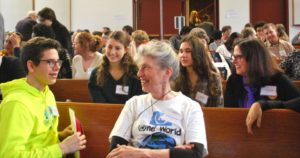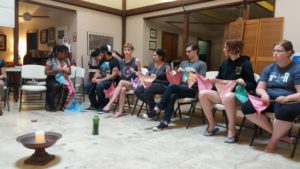CUC eNews: January 15, 2019 – Issue 73
In This Issue:
- Wet’suwet’en Blockade and the Challenge of Reconciliation
- CUC’s Advocacy on Assisted Dying Continues
- Legislation Removing “10 Percent Rule”
- UU-UNO Intergenerational Seminar
- 2019 Chorus Update
- Upcoming Events You Won’t Want to Miss
Wet’suwet’en Blockade and the Challenge of Reconciliation
The Canadian Unitarian Council (CUC) recognizes the sovereignty of Indigenous peoples and their authority to make decisions about what happens on their land. In the case of the Wet’suwet’en, who are opposing the development of a Coastal GasLink pipeline on their traditional territories in northwestern British Columbia, the Supreme Court of Canada affirmed that they have never ceded their traditional lands (Delgamuukw, 1997). This historic case specified what is required to claim Aboriginal title to land, affirmed the legal validity of oral history and clarified the government’s duty to consult with Indigenous peoples before proceeding with any development.
The Delgamuukw case specified three criteria for an Aboriginal title: 1) they occupied the land prior to the declaration of sovereignty, 2) they have occupied it in continuity up until the present time, and 3) this occupation has been exclusive. It also clarified that Aboriginal title would be forfeited to the Crown should the land be used in a way that is “irreconcilable with the nature of the claimants’ attachment to those lands”.
The Hereditary Chiefs have a long history of advocating for the preservation of their traditional land. The CUC recognizes the difference between elected Chiefs and Councils, and Hereditary Chiefs. The elected system of Chiefs and Councils was created by the colonial government to have jurisdiction within their reserve boundary. The authority of Hereditary Chiefs flows from the traditions of the Wet’suwet’en and they have jurisdiction over their entire traditional territory, which was never ceded or lost through war. The imposition of the Indian Act electoral system undermines a tradition of self-governance that existed effectively for thousands of years, well before the Confederation. Although TC Energy and governments may have obtained signed consent from the elected Chiefs and Councils they do not have the consent of the Hereditary Chiefs who maintain jurisdiction over the land where the pipeline is being proposed.
The CUC urges governments, the National Energy Board, and TC Energy to include the Wet’suwet’en Hereditary Chiefs in their duty to consult, recognizing that they have never ceded their lands, and the proposed pipeline is within their territory. In the spirit of reconciliation, we call on governments and industry to halt development, refrain from taking positions that would escalate tension within the First Nations, and stop using police to remove opposition. This is not a situation where free, prior and informed consent exists. First Nations have won more than 200 consecutive court cases in Canada related to governments failing to properly consult with the appropriate First Nations leaders, which has come at a considerable expense to taxpayers and the impacted Nations.
The CUC appeals to the federal government to uphold the commitment it made when it became a signatory of the United Nations Declaration on the Rights of Indigenous Peoples. We also urge the government to enact policies and standards that would ensure that industry complies with this declaration.
If right relations are ever to be achieved between settlers and Indigenous peoples, settler governments, police, industry and courts must be willing to break old patterns and set off on a new path committed to nation-to-nation respect and consent. It is no longer acceptable to send police to arrest Indigenous peoples for refusing to allow access to their territories. We must do better than this!
The reality is that reconciliation will be inconvenient. It will require change, interrupt the usual flow of business, and call us to a level of humility that will feel foreign to a country (and its citizens) with a long history of being anything but conciliatory in its relationships with Indigenous peoples. It will be hard to give up the privilege we have become accustomed to and may even feel scary. Where we go from here may not be clear, but we must find a way forward that is just. With the international protests of solidarity in recent days, it is clear that many are awakening to the issues, are committed to taking action, and are calling governments and industry to task.
Unitarians across Canada have been involved in active support. Rev. Shawn Newton, minister at First Unitarian Congregation of Toronto spoke from the rally in Toronto: “I attended the solidarity rally in Toronto because I believe the current approach on this situation is at odds with how we best move towards reconciliation in Canada. Reconciliation takes time, and it requires deep listening. I’m not convinced we have had enough of either, even in light of the court’s injunction. The use of force at this moment is not helpful and does not speak to the best of who we aspire to be in this country.”
Take Action!
To learn more about the Delgamuukw case: https://www.thecanadianencyclopedia.ca/en/article/delgamuukw-case
Contact:
Federal
The Right Honourable Justin Trudeau
Telephone: 613-992-4211, Fax: 613-941-6900
justin.trudeau@parl.gc.ca.
The Honourable Daniel Lametti, Minister of Justice and Attorney General of Canada
David.Lametti@parl.gc.ca, Fax: 613-954-0811
Find your Member of Parliament https://www.ourcommons.ca/Parliamentarians/en/members
Contact the RCMP directly and let them know your view of their impending operation.
National RCMP Headquarters
Telephone: 613-843-5999
Email: RCMP.HQMediaRelations-DGRelationsmedias.GRC@rcmp-grc.gc.ca (media contact)
Please take action in your own community along with other Indigenous Rights and Climate Justice activists in your area. Here are some of the other important ways you can support the Unist’ot’en, Gitdumt’en and the entire Wet’suwet’en Nation:
Donate to the Wet’suwet’en Access Point on Gitdumt’en Territory: https://www.gofundme.com/gitdumt039en-access-point
Donate to Unist’ot’en Camp: http://unistoten.camp/support-us/donate/
Donate to Unist’ot’en Camp Legal Fund: https://actionnetwork.org/fundraising/unistoten-camp-legal-fund
Get updates from Wet’suwet’en Access Point on Gitdumt’en Territory
Support and Sign the pledge from the Unist’ot’en
CUC’s Advocacy on Assisted Dying Continues
The Canadian Unitarian Council has a long history of advocating for the right to die and a deep belief that this is a human right. This history of advocacy includes:
- Three resolutions dating back to 1973.
- Representatives of the CUC appearing before the Special Senate Committee on Euthanasia and Assisted Suicide in 1994.
- Receiving intervenor status in a 2011 B.C. Supreme Court case on the issue because of its long-standing involvement in, and support for, the legalization of medically assisted dying.
- Receiving intervenor status again in 2014 when Carter v. Canada appeared before the Supreme Court of Canada in 2014, which resulted in the game-changing legalization of medical assistance in dying.
- Participating in the federal government’s consultations on implementing the ruling to legalize medical assistance in dying, presenting both oral and written submissions (the legislation was put in place in June 2016).
The CUC’s support for the right to die is based on multiple UU principles, including the inherent worth and dignity of every person; justice, equity, and compassion in human relations; and the use of the democratic process. In accordance with these principles, the CUC’s advocacy work on this issue continues, as it becomes an intervenor in 2019 in the case of Lamb v. Canada, challenging restrictions that limit assisted dying to those whose death is “reasonably foreseeable”. More information about this case will be in upcoming editions of the CUC eNews.
Read More About the CUC and Assisted Dying
Legislation Removing “10 percent rule” Good News for Canadian Charities

During the summer of 2018, an Ontario Supreme Court ruling struck down the 10 percent rule around engaging in political activity for charities. In response, the Minister of Finance tabled proposed changes to the Income Tax Act (ITA) in October that follows recommendations made by the Consultation Panel on the Political Activities of Charities.
These changes were introduced as Bill C-86 and now refer to the rules governing political activities by charities as “public policy dialogue and development activities” (defined in the explanatory notes for a related motion as activities “seeking to influence the laws, policies or decisions of a government, whether in Canada or a foreign country”).
This legislation has since passed, removing the 10% limit, and the distinction between “political activity” and other public policy work that charities do. Charities will still have to be strictly non-partisan in their public policy work, and all such work will need to be related to and further their charitable purpose as enforced by the Canada Revenue Agency.
2019 UU United Nations Office (UU-UNO) Intergenerational Spring Seminar
 With a deep passion for and commitment to international human rights, youth and adults from all over North America will gather for a three-day seminar, Equity in Action: Gender in an Intersecting World, to dig deeply into issues with global impact.
With a deep passion for and commitment to international human rights, youth and adults from all over North America will gather for a three-day seminar, Equity in Action: Gender in an Intersecting World, to dig deeply into issues with global impact.
The intergenerational seminar is an opportunity to collaborate with others while learning how to be a global activist. Through workshops, peer and expert-led panel discussions, community building activities, and worship services, participants undergo a transformative process of learning, reflection, and growth as we explore some of the most challenging issues facing humanity today.
Our 2019 Seminar will be April 11-13, in New York City. Addressing the 2019 theme of Equity in Action: Gender in an Intersecting World, participants will consider both local and global engagement with issues such as:
- Understanding the reality of the non-binary nature of gender and the conditioned performance of gender within a cultural context.
- Confronting internal biases, and finding opportunities for growth in mistakes.
- Working for gender equity at the intersection of dismantling systems of white supremacy, patriarchy, heteronormativity, and other forms of oppression.
- United Nations Sustainable Development Goal 5: “Achieve gender equality and empower all women and girls” – and all its associated targets.
- The #MeToo movement which calls the world to believe and support survivors of sexual violence.
Allison Hess, UUA International Engagement Associate says, “I’ve been involved with planning the Intergenerational Spring Seminar for five years now and each year I’m amazed at how inspiring it is no matter the topic – not just for participants but for staff as well! People of all ages bring out one another’s passions when they work together, and seeing this happen gives me great hope for the future of Unitarian Universalism and justice in our world.”
Ways to be Involved With the UU-UNO
Update: Chorus 2019
Chorus 2019, the third annual gathering of young UU adults, is happening at River’s Edge Camp & Retreat Centre! We’ll be occupying the Chalet at River’s Edge, a newly renovated building with 33 beds, a fully equipped kitchen, and open loft space. The camp is located near Cremona, Alberta, one hour’s drive north-west from Calgary, and boasts beautiful prairie sky and Rocky Mountain views. Transportation from Calgary will be provided.
Update: CUC 2019 Annual General Meeting (AGM)
Change of location: The 2019 AGM will be held at the Atrium at Centre for Social Innovation, 192 Spadina Ave, Toronto, ON, M5T 2C2. Download the proposed motions.
Share what’s going on in your congregation. Contact communications@cuc.ca
Deadline: the 14th of each prior month.
Join the Canadian Unitarian Council on Facebook!
Upcoming Events
National Events
CUC 2019 Annual General Meeting (AGM), May 11 from 1:00 – 4:30 p.m. ET / 10:00 a.m. – 1:30 p.m. PT. The Atrium at Centre for Social Innovation, 192 Spadina Ave (please note change of location).
CanUUdle XIX, May 17 – 20 – Hosted by the Unitarian Church of Calgary
CanUUdle is the annual national conference for Canadian UU youth and their adult advisors.
Registration will be available soon.
Chorus, May 17 – 20, Edge Camp Retreat Centre AB
Each year, Canadian UU young adults (18-35) gather to build beloved community, deepen our cross-country connections, and grow as spiritual beings. Chorus will be held at River’s Edge Camp & Retreat Centre near Calgary. Registration will be available soon.
Regional Events
30th Annual Southern Ontario Midwinter Retreat, February 1 – 3
All UU’s are welcome to this retreat, organized by Southern Ontario UUs, at the YMCA Cedar Glen Retreat Centre in Bolton, ON.
International Events
Equity in Action: Gender in an Intersecting World, April 11-13, 2019, New York City
The UU United Nations Office is excited to host this year’s Intergenerational Spring Seminar on gender equity in collaboration with the UU College of Social Justice. Programming will be interactive and intergenerational, encouraging participants to challenge their assumptions, connecting their activism with grounding in UU faith, and empowering them with the tools to bring back to their communities to make change locally and globally.
Youth and Young Adult
Gathered Here: Young Adult Check-In, 2-11, 3-11, 4-8, 5-6, 6-10, 7-8, 8-12, 8 p.m. ET
Gathered Here is a monthly online check-in and gathering for Canadian Unitarian Universalist young adults.
Peterborough Self Care UU Youth Con, Friday, January 22 – Sunday, February 24
Unitarian Fellowship of Peterborough, Ontario
Webinars
Financial Webinar with Clyde Harris – Part 3, January 23, 7:30 – 8:30 p.m. ET
Discussion: should charities rent out their property, why this should or should not happen, and the pros and cons of property rental.
Worship as a Beacon for Congregational Growth, Saturday, March 30, 9:30 – 12:30 p.m. PT (6:30 – 9:30 ET)
Part one of two, we’ll explore ways to create meaningful worship that engages minds, hearts, and spirits. Our presenter is the Rev. Dr. Barbara Wells ten Hove.
Connecting Across the Generations, April 13, 12:30 – 2:30 p.m, ET
Churches are one of the few places (outside of our own families) where we can make friends across the generations. How can we use that niche to build a sense of community, trust, connection, and care? Facilitated by Asha Philar, CUC’s Youth and Young Adult Ministry Specialist.
Roundtables and Virtual Gatherings
Board Legal Considerations 101, January 26, 12:30 p.m. ET
We’ll discuss insights and questions arising from the “Serving on a UU board in Canada: legal and practical perspectives” video which was prepared for UU congregations.
Practical Applications of Social Media, February 9, 12:30 p.m. ET
A followup to the December webinar on social media. Facilitated by Margo Ellis, this roundtable drills down to the practical aspects of how congregations use social media?
Virtual Gathering: Hope in Hard Times, Wednesday, March 6, 7 – 8:30 p.m. ET 0r Saturday, March 9, 12:30-2:00 p.m. ET
Arising out of common concern, voiced by religious professionals, we invite people to join in this time of reflection and sharing – looking at the ways we find Hope in Hard Times.


